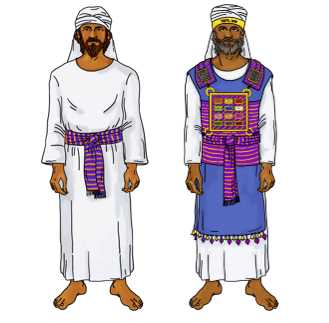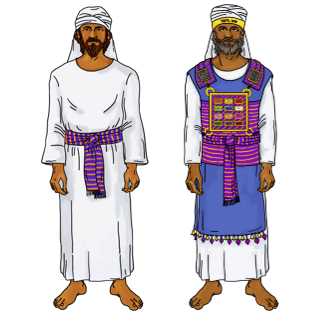Watch
Events
Articles
Market
More
And Joshua set up twelve stones in the midst of the Jordan, in the place where the feet of the priests bearing the ark of the covenant had stood; and they are there to this day.
Joshua 4:9
The active memorials commanded in Torah were given to remind us and future generations of what God has done for us. Although physical memorials like the one Joshua set up in Joshua 4:5-9 eventually fall (the stones must have been very large to withstand the spring floods year after year, but they aren't there now), it isn't possible to "fulfill" a calendrical memorial, such as Passover and Sukkot, so that it is no longer necessary, unless we no longer need to remember God's love and direction.



Shalom! Take a look at our 2 lessons we offer this week for parsha Tetzaveh. In lesson 20.1 called "Blueprints for the Set-apart Garments," we will be learning about the instructions for the set-apart garments Yahweh wanted Aharon and his sons the priests to wear in His Dwelling Place that Yahweh gave to Mosheh while he was on the mountain.
In 20.2 called "Blueprints for Appointing the Priests," we will learn about the detailed instructions Yahweh gave to Mosheh for the ordination of the priests who were appointed to serve Him in the Dwelling Place/Tabernacle. We will also look at the ingredients for the set-apart anointing oil.
You can find these lessons as well as all our lessons at: https://ymtoi.org/
We hope that Parsha Pearls blesses your home and remember to share any comments or photos with us on our YMTOI Facebook page or email us at: parshapearls@mtoi.org. We love to hear from our followers!
.
.
.
#Tetzaveh #Torah #Yahweh #Yeshua #Elohim #Messiah #messianic #torahobservant #mtoiworldwide #clevelandtn #ymtoi




Shalom! Take a look at our 2 lessons we offer this week for parsha Tetzaveh. In lesson 20.1 called "Blueprints for the Set-apart Garments," we will be learning about the instructions for the set-apart garments Yahweh wanted Aharon and his sons the priests to wear in His Dwelling Place that Yahweh gave to Mosheh while he was on the mountain.
In 20.2 called "Blueprints for Appointing the Priests," we will learn about the detailed instructions Yahweh gave to Mosheh for the ordination of the priests who were appointed to serve Him in the Dwelling Place/Tabernacle. We will also look at the ingredients for the set-apart anointing oil.
You can find these lessons as well as all our lessons at: https://ymtoi.org/
We hope that Parsha Pearls blesses your home and remember to share any comments or photos with us on our YMTOI Facebook page or email us at: parshapearls@mtoi.org. We love to hear from our followers!
.
.
.
#tetzaveh #torah #yahweh #yeshua #elohim #messiah #messianic #torahobservant #mtoiworldwide #clevelandtn #ymtoi




Shavuah tov, all. A couple quick items:
1. Every time you encounter a person in the larger Torah community that has a business, recommend that they set up a page on TTN to expand options, product availability, grow intentionally toward our own economy, etc...
2. Increase the size and scope of TTN in general by recommending this platform as often and as boldly as you have opportunity. We are building the Family and building the future economy by gathering and educating.
3. In terms of educating, we need to have and be able to deliver an elevator pitch (90 seconds or less) explanation of the importance of Family, restoration, and WHY #shopfamilyfirst !!
4. #shopfamilyfirst ! Make that your personal habit, and teach others to do the same.
Lastly, guessing you read this, but a recent blog post of mine has resonated with many and been shared quite a bit by my blog states... : https://natsab.com/2022/02/05/....building-the-kingdom


